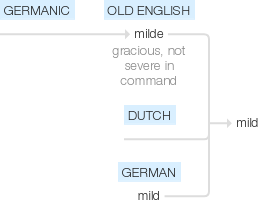Mild
Old English milde (originally in the sense ‘gracious, not severe in command’), of Germanic origin; related to Dutch and German mild, from an Indo-European root shared by Latin mollis and Greek malthakos ‘soft’.
wiktionary
From Middle English milde, from Old English milde(“mild”), from Proto-Germanic *mildijaz(“mild”), from Proto-Indo-European *melh₂-(“to beat, pound, grind”). Cognate with Scots mild, myld(“mild”), Saterland Frisian milde(“mild”), West Frisian myld(“mild”), Dutch mild(“mild”), Low German milde(“mild”), German mild(“mild”), Danish, Swedish and Norwegian Bokmål mild(“mild”), Icelandic mildur(“mild”), Latin mollis(“soft, gentle”), Lithuanian malonus(“pleasing, pleasant, kind”), Old Norse mildr.
etymonline
mild (adj.)
Old English milde, of persons, powers, or dispositions, "possessing softness or gentleness, good-tempered, merciful," from Proto-Germanic *milthjaz- (source also of Old Norse mildr (which also contributed to the English word), Old Saxon mildi, Old Frisian milde, Middle Dutch milde, Dutch mild, Old High German milti, German milde "mild," Gothic mildiþa "kindness"), from PIE *meldh-, from root *mel- (1) "soft," which is the source also of Latin mollis "soft."
Of weather, "not rough or stormy," late 14c. Of medicine, etc., "gentle or moderate in force, operation, or effect," c. 1400; of disease from 1744. Of rule, punishment, etc., "moderate in quality or degree, of mitigated force, not hard to endure," by 1570s. It was also used in Old English as an adverb, meaning "mercifully, graciously."
Mild goes further than gentle in expressing softness of nature; it is chiefly a word of nature or character, while gentle is chiefly a word of action. [Century Dictionary]
